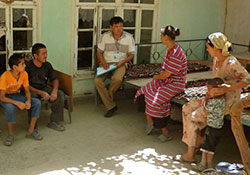Free and anonymous mental health counselling meets a great demand in Kyrgyzstan

WHO
In response to the inter-ethnic violent conflict, which escalated in June 2010 in the south of Kyrgyzstan, the WHO Country Office, Kyrgyzstan received funds from the Russian Federation in mid December 2010. These funds were mobilized through a flash appeal based on urgent needs.
The funds went into a a four-component project where mental health is the largest, supplemented by coordination, strengthening of access to health care and forensic assistance.
In mid-May 2011, two Community-based Mental Health Centres (CMHC), ‘Doverie’ in Jalalabad and ‘Dialog’ in Osh, were opened to provide free-of-charge and anonymous mental health counselling, treatment or referral to mental hospitals or other health care facilities. All staff of the two centres (2 psychologists and 2 psychiatrists, one receptionist per shift) is recruited from the respective oblast mental hospital. Staff received training on mental health by Bishkek Medical University, Mental Health Department experts on 10-14 May in Jalalabad.
In April 2011, mobile teams were created and staffed (one psychologist, one psychiatrist and one driver) by the mental oblast hospitals – two in Osh and one in Jalalabad. Four vehicles were handed over to two mental health hospitals, one in Osh and one in Jalalabad.
All three teams have been working according to a schedule agreed upon with the Ministry of Health and mainly visit remote areas. The teams call health facilities or community leaders in advance to announce their arrival and fill in specially designed forms, which need to be stamped by the local health care facility. WHO provides fuel and per diem for the mental health experts and monitors their visit in remote districts. The mobile teams screen, counsel and treat people but also refer patients with more serious problems to the mental health centers or hospitals in Osh and Jalalabad.
Since the start of the work in mid May 2011 in Jalalabad oblast more than 1,934 persons received counselling through the mobile team and the centre. In Osh 1,036 persons were counselled by two mobile teams and the centre and 3,651 by the NGO ‘Master Radosti’. In total 6,621 persons were counselled and more than 20,000 persons were screened since mid-April.
Mobile teams support earthquake victims
In connection with the strong earthquake, on 22nd July 2011 in Batken oblast, two mobile teams (one from Osh and one from Jalalabad) were sent to the most affected villages Kan, Sovetskoe, Pulgon, Orozbekova and Kadamjai town to provide psychological assistance to the affected population from 25-31 July 2011. During this period more than 650 patients were seen. The teams provided mental health counseling, psychotherapy and drug prescription and also instructed local health facilities on how to deal with patients with psychological disturbances related to the earthquake.
The demand of the services of the mobile teams and centres is huge, but people need to be informed and gain trust first. Therefore, a wide-spread advertising campaign was carried out in July–August 2011 to inform the population about the available services of mobile teams and centres. 15,000 leaflets in three languages (Russian, Kyrgyz and Uzbek) were distributed, a one month long newspaper advertising campaign was carried out in ‘Osh Park’ and Jalalabad’s ‘Akyikat’ and a TV banner with a short explanation of the purpose of the centres and their contact details ran on ELTR channel for four weeks in August 2011.
The centres are monitored regularly by WHO staff and a special WHO consultant. In order to provide technical support to the staff of CMHCs and mobile teams, the Regional Adviser for Mental Health of WHO/Europe visited Osh and Jalalabad in June 2011. Taking into account a major role of GPs in identification, diagnosis and referral for severe mental disorders, a working group of the Ministry of Health on mental health, coordinated by the WHO Country Office, Kyrgyzstan, has been involved in the training of general practitioners (GPs) in Osh and Jalalabad. Since May 2011, they have trained 307 GPs in both regions.
The project will be finished in October 2011 and the three mobile teams and the two centres will be included in the financial balance of the Ministry of Health, Oblast Mental Health Hospitals in Osh and Jalalabad. WHO is currently trying to find sponsors who will continue monitoring and supporting the teams and centres to guarantee an effective continuation of the much needed services in the region.



